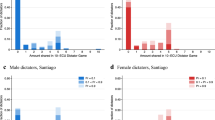Abstract
Some of the earliest work on heterogeneity in social preferences focuses on gender differences in behavior. The source of these gender differences is the main interest of this paper. We report on dictator game experiments designed to identify heterogeneity of other-regarding preferences according to personality, gender, status, and whether the choice is framed as giving or taking. We find that the effect of gender on giving is more subtle than previously understood, and is explained collectively by various personality factors. We also find that women, high status treatment individuals, and individuals in the giving language treatment give less, and are also less sensitive to the price of giving.
Similar content being viewed by others
References
Andreoni, J. (1995). Warm-glow versus cold-prickle—the effects of positive and negative framing on cooperation in experiments. Quarterly Journal of Economics, 110(1), 1–21.
Andreoni, J., & Miller, J. (2002). Giving according to GARP: an experimental test of the consistency of preferences for altruism. Econometrica, 70(2), 737–753.
Andreoni, J., & Vesterlund, L. (2001). Which is the fair sex? Gender differences in altruism. Quarterly Journal of Economics, 116(1), 293–312.
Ball, S., Eckel, C. C., Grossman, P. J., & Zame, W. (2001). Status in markets. Quarterly Journal of Economics, 116(1), 161–188.
Ben-Ner, A., Kong, F., & Putterman, L. (2004). Share and share alike? Gender-pairing, personality, and cognitive ability as determinants of giving. Journal of Economic Psychology, 25(5), 581–589.
Boone, C., De Brabander, B., & van Witteloostuijn, A. (1999). The impact of personality on behavior in five Prisoner’s Dilemma games. Journal of Economic Psychology, 20(3), 343–377.
Brandstatter, H., & Guth, W. (2002). Personality in dictator and ultimatum games. Central European Journal of Operations Research, 10(3), 191–215.
Brandts, J., Guth, W., & Stiehler, A. (2006). I want you! An experiment studying motivational effects when assigning distributive power. Labour Economics, 13(1), 1–17.
Cox, J. C., & Deck, C. A. (2006). When are women more generous than men? Economic Inquiry, 44(4), 587–598.
Eckel, C. C., & Grossman, P. J. (1998). Are women less selfish than men? Evidence from dictator experiments. Economic Journal, 108(448), 726–735.
Goldberg, L. R. (1981). Language and individual differences: the search for universals in personality lexicons. In L. Wheeler (Ed.), Review of personality and social psychology (pp. 141–165). Beverly Hills: Sage.
Goldberg, L. R. (1990). An alternative “description of personality”: the Big Five factor structure. Journal of Personality and Social Psychology, 59, 1216–1229.
Gujarati, D. N. (2003). Basic econometrics. New York: McGraw–Hill.
Harbaugh, W. T., Krause, K., & Berry, T. R. (2001). GARP for kids: on the development of rational choice behavior. American Economic Review, 91, 1539–1545.
Koole, S. L., Jager, W., van den Berg, A. E., Vlek, C. A. J., & Hofstee, W. K. B. (2001). On the social nature of personality: effects of extraversion, agreeableness, and feedback about collective resource use on cooperation in a resource dilemma. Personality and Social Psychology Bulletin, 27(3), 289–301.
Krupka, E. L., & Weber, R. A. (2009). Identifying social norms using coordination games: why does dictator game sharing vary? Department of Social and Decision Sciences, Paper 98. Carnegie Mellon University.
Kumru, C., & Vesterlund, L. (2008). The effect of status on voluntary contribution. Working Paper.
LePine, J. A., & Van Dyne, L. (2001). Voice and cooperative behavior as contrasting forms of contextual performance: evidence of differential relationships with Big Five personality characteristics and cognitive ability. Journal of Applied Psychology, 86(2), 326–336.
McCrae, R. R., & Costa, P. (1990). Personality in adulthood. New York: Guilford.
Schmitt, D. P., Realo, A., Voracek, M., & Allik, J. (2008). Why can’t a man be more like a woman? Sex differences in Big Five personality traits across 55 cultures. Journal of Personality and Social Psychology, 94(1), 168–182.
Swope, K. J., Cadigan, J., Schmitt, P. M., & Shupp, R. (2008). Personality preferences in laboratory economics experiments. Journal of Socio-Economics, 37(3), 998–1009.
Varian, H. R. (1982). The nonparametric approach to demand analysis. Econometrica, 50(4), 945–974.
Author information
Authors and Affiliations
Corresponding author
Electronic Supplementary Material
Below is the link to the electronic supplementary material.
Rights and permissions
About this article
Cite this article
Visser, M.S., Roelofs, M.R. Heterogeneous preferences for altruism: gender and personality, social status, giving and taking. Exp Econ 14, 490–506 (2011). https://doi.org/10.1007/s10683-011-9278-4
Received:
Accepted:
Published:
Issue Date:
DOI: https://doi.org/10.1007/s10683-011-9278-4




